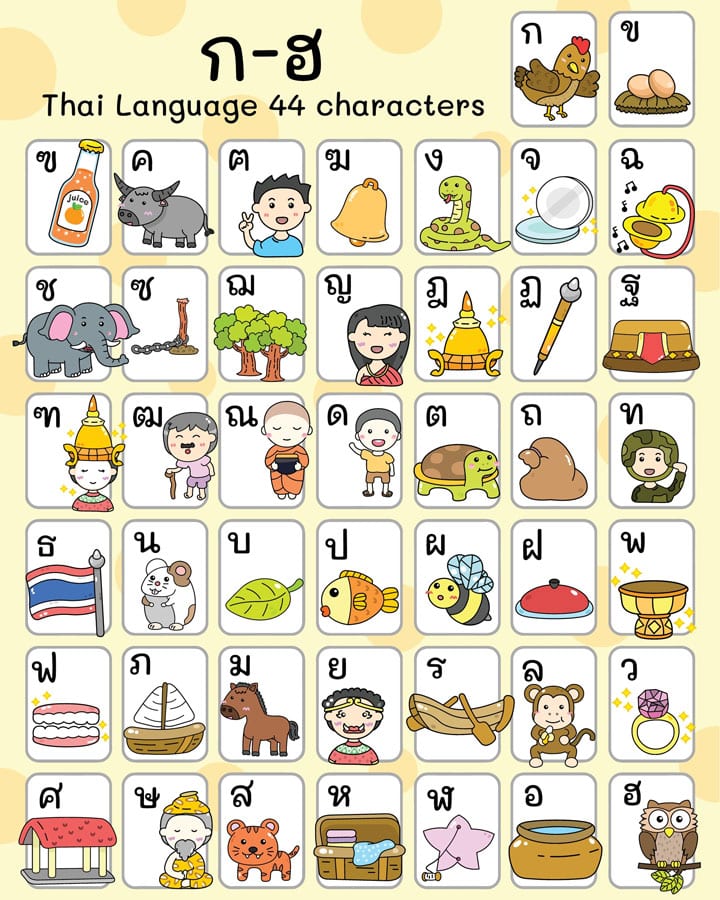Discover Thailand (10): The Thai language
The Thai language is the official language of Thailand, spoken by approximately 65 million people in the country and abroad. The Thai language is a tonal language, which means that the accent and pitch of the words are important to the meaning of the sentence. This makes the language sometimes challenging for foreigners to learn, but also unique and fascinating.
One of the characteristics of the Thai language is that it is written with its own alphabet consisting of 44 characters. This alphabet is based on the Khmer alphabet, which was introduced to Thailand in the 13th century. Another feature of the Thai language is that it contains a number of unique sounds that cannot be found in other languages. These sounds include the “ng” sound, which is produced by placing the tongue at the back of the mouth, and the “r” sound, which is produced by pressing the tongue against the roof of the mouth. These sounds can be difficult for foreigners to produce, but are essential for speaking the Thai language correctly.
The Thai language is a tonal language, which means that the meaning of a word can change depending on how it is pronounced. The language has five different tones – high, low, rising, falling and neutral – each of which can have a different meaning for the same word. This can sometimes be difficult for foreigners to understand, but over time you can learn to distinguish and understand the tones.
Another peculiarity of the Thai language is the script used. Unlike many other Asian languages, such as Chinese and Japanese, the Thai language does not use ideograms or kana. Instead, it uses an abugida script, which means that each letter at the beginning of a word has its own shape, and changes shape when it appears at the end of a word. The Thai letters are carefully designed and have a beautiful and unique look. They are written from left to right, and have different diacritics that indicate how a word should be pronounced.
Another characteristic of the Thai language is that it uses a unique form of address and venerable terms. In Thai, it is important to use proper forms of address to show respect to other people, depending on their age, gender, and social status. In conjunction with the use of forms of address and venerable terms, there is also an emphasis on the use of politeness and friendliness in Thai. Thai culture strives for friendliness and courtesy in social interactions, and this is reflected in the language. For example, polite forms of words are often used instead of the direct form. The Thai language has different levels of formal and informal language use. For example, there is a formal level of language for use with kings and other dignitaries, and an informal level of language for use with friends and family.
Although the Thai language is officially spoken throughout the country, local dialects and variants are widely used. This means that some words and phrases that are common in one part of the country may be unfamiliar in another part of the country. This can be difficult for some foreigners learning the Thai language, but it is also one of the features that makes the Thai language so fascinating and unique.
In short, the Thai language is unique and fascinating, known for its tonal character, its own alphabet and its unique sounds.




“each letter at the beginning of a word has its own shape, and changes shape when it appears at the end of a word”
For “shape” tone will be meant otherwise I don't understand
“the “ng” sound, which is produced by placing the tongue in the back of the mouth, and the “r” sound,”
the "ng" sound will also be at the beginning of a syllable, the "r" sound is a common sound for Westerners and can therefore not cause any problems.
Nice contribution.
And then to mention that the Thai do not use capital letters or punctuation marks
and write everything together.
On a Dutch language site it was once about the essential importance
of punctuation marks and capital letters to delineate our sentences,
otherwise we would remain morons and illiterates,
because no one would be able to read what we wrote…
I questioned that.
I noticed that Thai people were very normal after all
and as many doctors, engineers, pilots, chemists, etc. as we had.
And usually learned a second alphabet, usually English, so the Latin alphabet, completely different from Thai.
But that they didn't write any punctuation marks...
So that it was very questionable whether punctuation marks are so necessary to understand each other.
What a commotion that caused: I was called a cultural barbarian. Or prankster.
Apparently no one could imagine that.
I wanted to tear down our beautiful linguistic cultural achievements…
Like many here, I have been married to a Thai for years and have been coming to Thailand for an average of 30 months for 2 years. So I speak a nice word compared to an average tourist and can manage a bit in horrific Thai.
To really learn the language beyond this bare minimum, it is essential to learn the script, or so I was once told. The phonetic writing of new words on my PC, which I do now, is seriously insufficient. And I think that's really the case. But guys it's hard. Or are there people among us who find it sufficient in this way and do not find learning to write necessary?